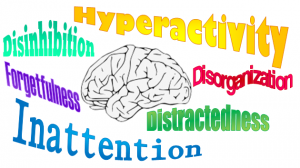 Attention-Deficit/Hyperactivity Disorder, commonly referred to as ADHD, is a neurobiological disorder characterized by developmentally inappropriate impulsivity, inattention, and hyperactivity.
Attention-Deficit/Hyperactivity Disorder, commonly referred to as ADHD, is a neurobiological disorder characterized by developmentally inappropriate impulsivity, inattention, and hyperactivity.
People with ADHD can be very successful in their life. For example, some well-known people have been diagnosed with ADHD such as Albert Einstein (scientist), Dwight D. Eisenhower (US President), Hillary Duff (actress/singer), Whoopi Goldberg (actress), Jason Kidd (basketball player), and Suzanne Somers (actress).
However, without appropriate identification and treatment, ADHD can have serious consequences. Individuals with ADHD may experience difficulties with school work, exhibit poor social skills, and display conduct problems. Early identification and treatment are extremely important so if you notice concerns please consult with a psychologist or talk with your child’s doctor.
Below are a few ways you can make your child’s life manageable at home.
1. Set clear, behavioral expectations.
Many children will benefit from establishing clearly defined rules. However, for children with ADHD this is extremely important. They will benefit from knowing exactly what is expected. Avoid telling your child “you can earn a reward for good behavior”. Instead, say “you can earn a reward for cleaning up your books after being told the first time”.
2. Write things down to help with organization.
Children with ADHD are often distracted and forgetful. Writing things down helps them with completing tasks in a timely manner. Additionally, it helps parents from getting frustrated for constantly repeating instructions or directions. Talk with your child to see what would make life easier for them. Some kids may want a daily planner, while others may prefer a check list.
3. Provide frequent positive attention.
Children with ADHD greatly benefit from reinforcement of appropriate behavior. Verbal praise can provide them with motivation to complete tasks and make them feel more confident in their abilities. Just think about it for a second. Would you rather work for a boss who tells you “great job” or “you never do anything right”.
4. Talk with your child’s teacher.
Many children with ADHD may need accommodations in the classroom. For example, it often helps to sit near the front of the class or away from windows to prevent distractions. Being an advocate for your child’s needs are important. You may also be able to see what works in the classroom to help your child be successful at home. Having consistently across home and school can help with structure.
5. Appropriately manage ADHD medication.
If the difficulties associated with ADHD are moderate or severe it is recommended that you consult with a pediatrician or psychiatrist for medication management. There is some evidence showing benefits of medication for treating ADHD in young children, however it is unclear how medication affects the child’s brain. Several brands of medication exist to treat ADHD symptoms. If one doesn’t work well it may be possible to switch to another medication. If you have concerns about the medication always talk to your doctor.
Source:
